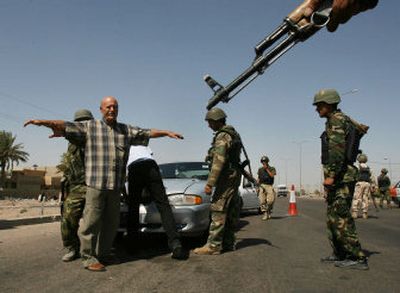Iraq leader offers amnesty on first day of crackdown

BAGHDAD, Iraq – Prime Minister Nouri al-Maliki on Wednesday proposed a limited amnesty to help end the Sunni Arab insurgency as part of a national reconciliation plan that al-Maliki said would be released within days. The plan is likely to include pardons for those who had attacked only U.S. troops, a top adviser said.
Al-Maliki’s declaration of openness to talks with some members of Sunni armed factions, and the prospect of pardons, are concessions that previous, interim governments had avoided. The statements marked the first time a leader from Iraq’s governing Shiite religious parties has publicly embraced national reconciliation, welcomed dialogue with armed groups and proposed a limited amnesty.
Reconciliation could include an amnesty for those “who weren’t involved in the shedding of Iraqi blood,” al-Maliki told reporters at a Baghdad news conference. “Also, it includes talks with the armed men who opposed the political process and now want to turn back to political activity.”
Al-Maliki stressed that he had not yet met with the Sunni resistance and added, “We will talk to those whose hands are not stained with blood, and we hope they would rethink their strategy.” He vowed that they “will not be able to interrupt the political process, either by wanting to bring back the old regime, or imposing an ugly, ethnic new regime upon Iraq.”
As al-Maliki spoke, Iraqi soldiers and police led the first day of a security crackdown in Baghdad. A force of more than 30,000 uniformed Iraqi security personnel, backed by more than 30,000 U.S.-led foreign troops, enforced the first day of a dusk-to-dawn curfew and stepped up checkpoints throughout the capital. Iraq’s Interior Ministry said Tuesday that no additional troops were brought in for the operation.
Thanks to Wednesday’s expanded checkpoints – one of the first clear efforts of al-Maliki’s new government – there were traffic-snarling jams across Baghdad. “We have noticed less and less people shopping, but I would rather have security than more customers,” said Wisam Saad, 29, who stood in a shop empty of customers, surrounded by cigar boxes, teapots and trinkets.
Iraq’s previous, transitional government, led by Ibrahim al-Jaafari, a Shiite, launched a similar crackdown last year but it failed to deter violence. After elections in December selected Iraq’s first full-term parliament since the fall of Saddam Hussein, al-Maliki won appointment as prime minister. His month-old administration has seen rapid movement on some long-standing demands from Sunni opponents of the Shiite governments, such as the U.S.-Iraqi agreement to free thousands of detainees in U.S.-run prisons in Iraq this month. Hundreds are due to be released from the Abu Ghraib prison today.
Al-Maliki’s security crackdown and talk of amnesty and reconciliation came a day after President Bush’s unannounced visit to Baghdad’s heavily fortified Green Zone.
However, the violence continued Wednesday. A bomb placed in a parked car exploded in northern Baghdad, missing the police patrol that was its apparent target but killing four civilians. A photographer for the Reuters news service, caught in the traffic, reported witnessing bystanders sticking bars into vehicles in an effort to pull out victims who were burning alive.